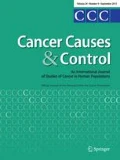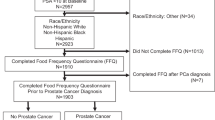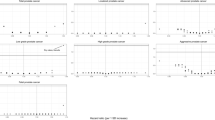Abstract
Objectives: To examine the associations between prediagnostic energy, fat, and vitamin A intake and survival from prostate cancer.
Methods: Two hundred and seven cases of prostate cancer from Toronto and 201 cases from Vancouver provided diet histories at diagnosis between 1989 and 1992 and were followed for survival from prostate cancer. After exclusions for various reasons, 263 cases (135 from Toronto, 128 from Vancouver) were analyzed in Cox proportional hazards models.
Results: Following adjustments for clinical stage, histologic grade, and other factors, significantly lower risks of dying from prostate cancer in the highest compared with the lowest tertiles of monounsaturated fat intakes were observed in each city and in the combined city analyses (combined cities: hazard ratio [HR] = 0.3; 95% confidence interval (CI) = 0.1–0.7). Survival from prostate cancer was significantly better for cases in the highest tertile of energy intake in Toronto (HR = 0.1; CI = 0.01–0.6) in contrast to that in Vancouver where these cases did relatively worse (HR = 2.6; CI = 0.6–10.7). Other nutrients were either not consistently or not significantly associated with prostate cancer survival in the two cities.
Conclusions: This bi-center cohort study observed a consistent and significant inverse association between the premorbid intake of monounsaturated fat and risk of death from prostate cancer. The inconsistent results for energy intake between cities could potentially be attributed to non-respondent bias in Toronto.
Similar content being viewed by others
References
Cancer Facts and Figures 1998 (1998). Atlanta: American Cancer Society.
Canadian Cancer Statistics 1998 (1998). Toronto: National Cancer Institute of Canada.
Kolonel LN (1996) Nutrition and prostate cancer. Cancer Causes Control 7: 83–94.
Andersson S-O, Wolk A, Bergstrom R, et al. (1996) Energy, nutrient intake and prostate cancer risk: a population-based case-control study in Sweden. Int J Cancer 68: 716–722.
Ghadirian P, Lacroix A, Maissoneuve P, et al. (1996) Nutritional factors and prostate cancer: a case-control study of French Canadians in Montreal, Canada. Cancer Causes Control 7: 428–436.
Daviglus ML, Dyer AR, Persky V, et al. (1996) Dietary beta-carotene, vitamin C, and risk of prostate cancer: results from the Western Electric Study. Epidemiology 7: 472–477.
Heinonen OP, Albanes D, Virtamo J, et al. (1998) Prostate cancer and supplementation with a-tocopherol and b-carotene: incidence and mortality in a controlled trial. J Natl Cancer Inst 90: 440–446.
Fradet Y, Meyer F, Bairati I, Shadmani R, Moore L (1999) Dietary fat and prostate cancer progression and survival. Eur Urol 35: 388–391.
Carter JP, Saxe GP, Newbold V, Peres CE, Campeau RJ, Bernal-Green L (1993) Hypothesis: dietary management may improve survival from nutritionally linked cancers based on analysis of representative cases. J Am Coll Nutr 12: 209–226.
Rohan TE, Howe GR, Burch JD, Jain M (1995) Dietary factors and risk of prostate cancer: a case-control study in Ontario, Canada. Cancer Causes Control 6: 145–154.
Jain M, Howe GR, Harrison L, Miller AB (1989) A study of the repeatability of dietary data over a seven year period. Am J Epidemiol 129: 422–429.
Jain M, Howe GR, Rohan T (1996) Dietary assessment in epidemiology: comparison on food frequency and a diet history questionnaire with a 7–day food record. Am J Epidemiol 143: 953–960.
Jain M, Howe GR, Johnson KC, Miller AB (1980) Evaluation of a diet history questionnaire for epidemiologic studies. Am J Epidemiol 111: 212–219.
Manual for Staging of Cancer (1987). Philadelphia: American Joint Committee on Cancer.
Manual for Staging of Cancer (1992). Philadelphia: American Joint Committee on Cancer.
TNM Classification of Malignant Tumors (1997). Toronto: International Union Against Cancer.
Morenas ADL, Siroky MB, Merriam J, Stilmant MM (1988) Prostatic adenocarcinoma: reproducibility and correlation with clinical stages of four grading systems. Human Pathol 19: 595–597.
Watt BK, Merrill AL (1963, expansion 1972) Composition of Foods: Raw, Processed, Prepared (USDA Handbook no. 8). Washington, DC: Agriculture Research Service, US Department of Agriculture.
SEER Program (1993) Comparative Staging Guide for Cancer. Major Cancer Sites: Colon and Rectum, Lung and Bronchus, Breast, Female Genital, Prostate Gland, Urinary Bladder. Bethesda, MD: National Institutes of Health.
Cox DR (1972) Regression models and life tables. J R Stat Soc 34: 187–220.
Willett W, Stampfer MJ (1986) Total energy intake: implications for epidemiologic analyses. Am J Epidemiol 124: 17–27.
Gleason DF (1992) Histologic grading of prostate cancer: a perspective. Human Pathol 23: 273–279.
Kelsey JL, Whittemore AS, Evans AS, Thompson WD (1996) Methods in Observational Epidemiology. New York: Oxford University Press.
Elmstahl S, Gullberg B (1997) Bias in diet assessment methods consequences of collinearity and measurement errors on power and observed relative risks. Int J Epidemiol 26: 1071–1079.
Annual Demographic Statistics, 1995 (1996). Statistics Canada, Catalogue no. 91–213–XPB. Ottawa: Minister of Industry.
Hebert JR, Hurley TG, Olendzki BC, Teas J, Ma Y, Hampl JS (1998) Nutritional and socioeconomic factors in relation to prostate cancer mortality: a cross-national study. J Natl Cancer Inst 90: 1637–1647.
Wang Y, Corr JG, Thaler HT, Tao Y, Fair WR, Heston WDW (1995) Decreased growth of established human prostate LNCaP tumors in nude mice fed a low-fat diet. J Natl Cancer Inst 87: 1456–1462.
Clinton SK, Palmer SS, Spriggs CE, Visek WJ (1988) Growth of Dunning transplantable prostate adenocarcinomas in rats fed diets with various fat contents. J Nutr 118: 908–914.
West DW, Slattery ML, Robison LM, French TK, Mahoney AW (1991) Adult dietary intake and prostate cancer risk in Utah: a case-control study with special emphasis on aggressive tumors. Cancer Causes Control 2: 85–94.
Bairati I, Meyer F, Fradet Y, Moore L (1998) Dietary fat and advanced prostate cancer. J Urol 159: 1271–1275.
Giovannucci E, Rimm EB, Colditz GA, et al. (1993) A prospective study of dietary fat and risk of prostate cancer. J Natl Cancer Inst 85: 1571–1579.
Ross RK, Henderson BE (1994) Do diet and androgens alter prostate cancer risk via a common etiologic pathway? J Natl Cancer Inst 86: 252–254.
Rao GN (1996) Influence of diet on tumors of hormonal tissues. Prog Clin Biol Res 394: 41–56.
Whittemore AS, Kolonel LN, Wu AH, et al. (1995) Prostate cancer in relation to diet, physical activity, and body size in blacks, whites, and asians in the United States and Canada. J Natl Cancer Inst 87: 652–661.
Severson RK, Nomura AMY, Grove JS, Stemmerman GN (1989) A prospective study of demographics, diet, and prostate cancer among men of Japanese ancestry in Hawaii. Cancer Res 49: 1857–1860.
Author information
Authors and Affiliations
Rights and permissions
About this article
Cite this article
Kim, D.J., Gallagher, R.P., Hislop, T.G. et al. Premorbid diet in relation to survival from prostate cancer (Canada). Cancer Causes Control 11, 65–77 (2000). https://doi.org/10.1023/A:1008913620344
Issue Date:
DOI: https://doi.org/10.1023/A:1008913620344




